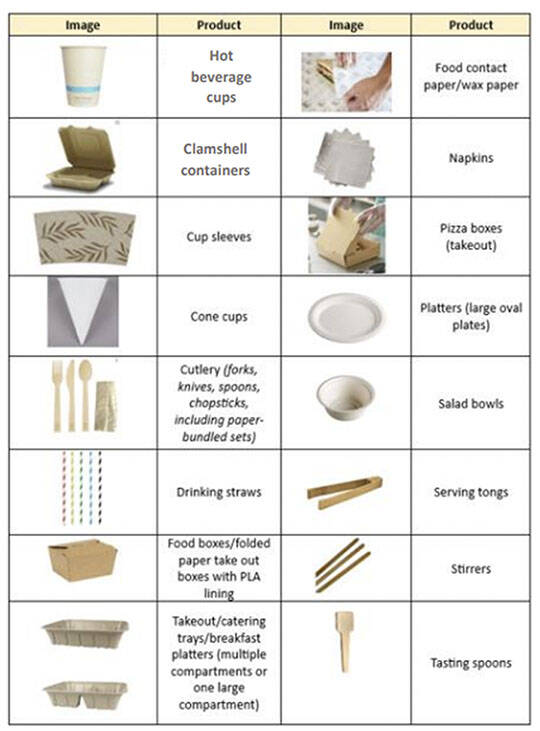It may not be the last straw, but it’s the last straw customers are going to like.
“You can watch the environmental consciousness drain from their eyes at precisely the rate at which their straw dissolves in their drink,” Joseph Raymond of Pleasant Beach Village said.
Raymond and other business representatives, along with some customers, provided written comments about the home compostable food service ware law the Bainbridge Island City Council plans to discuss Nov. 14.
While many of the comments agree with the ideal of using less plastic to help the environment, they also say the products to replace them are expensive and lack quality. They also say the public and the city’s service providers are not ready to compost the new products, and they will just end up in the landfill anyway.
The city counters that it worked with the chamber, downtown association and BI Zero Waste to come up with the list that was then looked at by businesses and the community.
The 16 items on the list are: clamshell containers, cone cups, cup sleeves, cutlery, drinking straws, food boxes, food contact paper, hot beverage cups, napkins, pizza boxes, platters, salad bowls, serving tongs, stirrers, takeout trays and tasting spoons. Based on the feedback, cups for cold beverages were removed from the list.
But comments from business people were still against the law.
Stacey Wadkins at Sweet Dahlia said, “The increase in cost will still be a problem with my small business and other small businesses on the island.”
Anita Rockefeller said, “I support the city’s efforts to move away from plastic, but do not want customers’ experience to be yet another challenge to restaurants’ survival on the island.”
Kay Bohlke said: “Every day I see people put commercial compost packaging into our trash bin instead of the one outside the city claims is for compost. There is no point to having these products that cost more on the claim they are compostable that are put into landfill by user error. If restaurants got products that were home compostable we would be assuming everyone composts, which is false. Restaurants have a hard enough time paying staff so why put more stress on the system?”
Lisa Alfieri said, “Additional negative financial impacts continue to be challenging in that we are in fact still recovering from the results of COVID, including dramatically increased cost of goods, challenging hiring pools, ongoing supply chain issues, and the fact that we now need to purchase home compostable products for everything we produce as a grab and go business.”
Kate Durand said, “I have made a huge effort to reduce the environmental impact of packaging at Bon Bon since I bought the store in March. I have switched to compostable cello bags for my candy packaging. I use wooden knives for fudge, and I have removed the extra paper that used to be used inside our fudge gift boxes.”
Residents seemed to echo those views.
Shannon Fong said most items will end up in the trash. “Enforcing changes on businesses that won’t make a difference in the long run does not help anyone.”
Anna Lyons said, “I think that everyone’s heart is in the right place but the reality is that these items don’t actually make any difference. Many of these items are advertised as ‘compostable’ but in reality, they do not break down as advertised and in the end, they end up hurting real compost.”
Louis De Lude had a different reason for being against the law. “I am amazed at the skyrocketing cost of going out to a meal not just on BI but overall. Food inflation has not been under any control since the end of COVID. The added burden of providing these disposable food service items without concern of the actual cost of these items and what impact they have on the final meal cost is not addressed by any report I have seen.”
Also at Tuesday’s meeting
State lobbyist Briahna Murray will give a presentation on top priorities that include: The Japanese American Exclusion Memorial, affordable and workforce housing; and planning for growth that meets unique community needs.
Regarding budget modifications, there will be a public hearing. City finance director DeWayne Pitts will show a PowerPoint that says $8.5 million more is being requested. Reserves will decrease $2.3 million, but the $13.4 million left would still cover eight months of operating expenses. Pitts says this level of spending can’t continue as taxes and fees will need to be raised or spending cut in upcoming years.
Under regular business, it will also receive reports on the Winslow Subarea and Comprehensive plans, and consider a funding request of $20,000 from the Kitsap Economic Development Alliance.
In the consent agenda, it will: repeal the moratorium on inns in Neighborhood Centers and adopt new regulations; apply for a state grant of $233,000 for electric vehicle charging; and issue a request for proposals for a community plan for visual, performing and literary arts on BI.
The council also will consider two requests by Councilmember Leslie Schneider: one to create a subcommittee on sustainable transportation; the other to look at requirements for electric car charging infrastructure in new commercial and multi-family developments.
The council will also proclaim Nov. 25 “Small Business Saturday,” Nov. 13-19 “Transgender Awareness Week” and Nov. 20 “Transgender Day of Remembrance,” and November “National Native American Month.”



